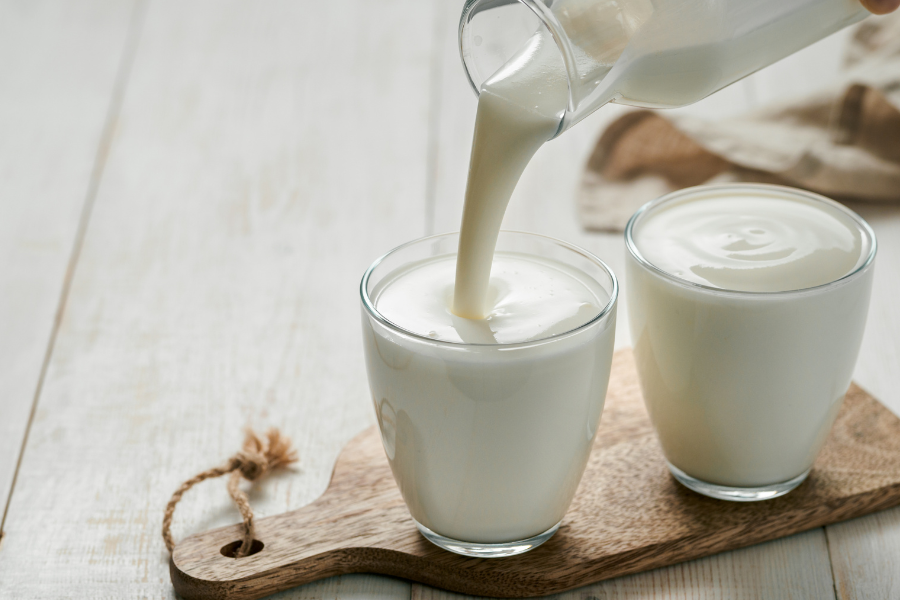If you're like us, and you have a fluffy buddy (or three), you consider them a part of your family. And just like us, dogs deal with a lot of the same issues we do, including minor to moderate G.I. distress. The nice thing is, because we share so much in common with dogs, a lot of the same things that help us with our digestion, like digestive enzymes, may also help pups. Without getting too technical, enzymes are like little assistants that help your (or your dog's) body break down food, allowing your body to absorb all the nutrients food has to offer.
If you're more of a DIY person vs. running to the store to buy something store bought, this blog is just what the vet ordered. We will break down foods (pun intended) that have natural enzymes in them, and give ya an easy to follow recipe to make your own digestive enzyme paste!
The Science Behind Digestive Enzymes
So let's dive right into it, shall we? What the heck are digestive enzymes and can giving them to your dog help their health? First of all.. here is a fun fact: digestive enzymes are actually proteins! They act to break down different types of nutrients into usable forms for your, or your dog's body. They turn carbs, proteins, and fats into sugars, amino acids, and fatty acids. These little scientific miracles may just help your pooch stay waggin' and healthy (though research about enzyme supplementation for dogs has shown mixed results).
The thought is that if your dog does not produce enough enzymes, which your vet can assess, they may not be digesting their food properly and could benefit from supplementation - either with homemade or pre-packaged supplements.
Doggy Digestion 101: The Enzymes Your Pooch Needs!
Let's cover some digestive enzymes 101. Your dog's digestive system is like a mini biome, with bacteria (some good bacteria, maybe some bad), and enzymes like protease, lipase, and amylase. Each of these enzymes works to break down different nutrients. Amylase works on carbs, protease (you can probably guess this one) breaks down proteins, and lipase works on fats.
With each enzyme having its own cool little mission, these three work in concert to make sure your dog gets the best from their kibble and treats. While some of these mighty enzymes naturally come from your dog's body, others need an extra boost to meet dietary needs.
What’s Up, Pup? Signs Your Doggy Might Need Digestive Help
How do you know if your dog actually needs enzymes? First, you will need to be extra observant - are they gassy? Do they seem bloated, or have frequent bouts of diarrhea? Or have they lost an unusual amount of weight? These could all be signs that your dog is not digesting their food properly. To rule out any more serious issues, you should first check in with your vet before jumping on the enzyme train.
What Foods are High In Natural Digestive Enzymes?
If you are trying to get super jazzy with your dog's diet (which your dog will thank you for in licks, of course), try adding some enzyme-rich foods into the mix. Pineapple, for instance, is not only a super food, but it is also packed with an enzyme called bromelain, which is amazing at breaking down proteins. Another tropical fruit, papaya, comes in hot with papain - another great digestive-assisting enzyme. And bananas are actually chalk-full of the enzyme amylase!
To take it even further, you can slip in some fermented yum yums like yogurt and kefir, which are teeming with friendly bacteria (also called probiotics) and enzymes. And last, but certainly not least, potatoes and carrots have a good amount of enzyme activity in 'em, and they are bursting with color, and fiber!
What's Cooking for Doggy's Tummy?
Whipping up your own digestive enzymes for your pup may sound overwhelmingly difficult, we know, buttt you may be surprised to learn it is actually as easy as pie (a lot easier than pie). All you need is three ingredients; kefir, raw honey, and papaya, and you're good to go!
Get Your Paws on This - DIY Enzyme Goo!
This enzyme paste is a sinch! All you have to do is smash up (or you can use a food processor if you really want to, but not totally needed), add a spoonful of kefir, and some honey, and mix! What's next? That is it! Promise.
You can store this in the fridge for up to a week. After about a week it won't have as much enzyme punch to it.
Add a spoonful to your dog's chow every day and voilà - bon appétit, doggy style!
Getting Your Dog to Dig Enzymes
Getting your dog to like enzymes can be pretty easy, especially if you have a dog that is a food advocate (as, let’s face it, most dogs are). You can simply add the paste or a small amount of an aforementioned enzyme-rich food into their dog food. If you have a dog who is more on the stubborn side when it comes to food and eating, try coating or hiding the enzyme paste in one of their favorite treats (like string cheese). Positive verbal reinforcement and coaxing in this situation never hurt anyone!
The idea here is to be consistent, as daily usage is the real way to unlock the magic of enzymes.
How Much is Just Enough?
When is comes to dosage of anything for your dog, always start low and go slowly. With this enzyme paste you just concocted, try starting with 1/2 teaspoon if you have a small dog, and 1 teaspoon per day for a medium to larger dog. Be vigilant, and write down any changes you notice, and adjust as needed.
When to Give Your Vet a Shout
While homemade recipes of any sort can be great, they may not be enough to get your dog over the hump (another pun, definitely intended) with their digestive issues. If you give your dog some foods high in digestive enzymes (or make said paste), and their belly issues persist, consult your vet. A check-in with them may be in order.
Potential Long Term Benefits
The thought of our furry friends living their absolute best lives is what we all strive for, and enzymes could be one component that helps you and them achieve that vision. Regular enzyme supplementation could help your dog deal with less digestive troubles over the course of their lives, allow them to absorb more nutrients, rock a more gorgeous coat, and just being overall be more awesome! It's a bit like giving their day-to-day life a little high-five.
Wrap-Up - Jumping In, Paws First!
So, homemade digestive enzymes for your dogs are easier than you thought, right? With your vet's supervision, this could be one of the best things you do for your dog's health. Just be sure to keep it all-natural, monitor your dog's response to any new food or supplement, and hopefully your your furry munchkin will be chowing down their meals (and digesting them well) in no time.
If you are looking for more resources about dog digestion check out our blog and do not be afraid to reach out!
FAQ
Is apple cider vinegar a natural digestive enzyme?
Apple Cider Vinegar is all the crazy these days (or ACV, as the cool peeps refer to it as). Apple Cider Vinegar's health benefits stretch far and wide, and although it does not technically have digestive enzymes in it, it can help balance and soothe digestive issues by encouraging the body to produce more digestive juices & enzymes (when given carefully, in moderation, and under your vet's supervision).
If you want to give ACV a try for your pooch, start by mixing a small amount (very small, like 1 tsp) into their food or Gatorade (joking! water). Before you do this, it would be responsible of you to have a quick chat with your vet to know if apple cider vinegar is a good fit for your pup.
References
1) Villaverde C, Manzanilla EG, Molina J, Larsen JA. Effect of enzyme supplements on macronutrient digestibility by healthy adult dogs. J Nutr Sci. 2017 Apr 18;6:e12. doi: 10.1017/jns.2017.10. PMID: 28620487; PMCID: PMC5465853.



